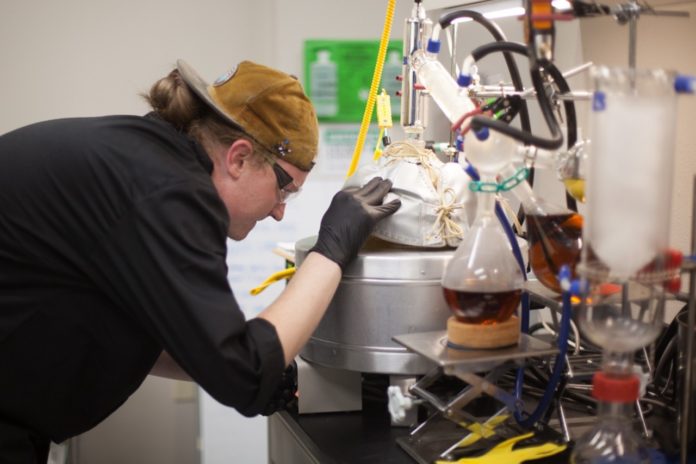^
- Local
- Community
- Journalism
Support the independent voice of Denver and help keep the future of Westword free.
The University of Colorado Boulder has partnered with Charlotte’s Web to lead a study about hemp-derived CBD’s impact on two important qualities of life. CU Boulder’s Research and Education Addressing Cannabis and Health (REACH) center and the Colorado-based CBD company want their research to target sleep and anxiety, two of the most common reasons cited for CBD use.
Lead researcher Dr. Monika Fleshner has been at the front of facilitating the REACH center’s collaborations with the cannabis industry, with hopes to better understand cannabis-derived methods used to reduce prolonged stress exposure.
Since Colorado legalized medicinal and recreational marijuana, Fleshner had heard anecdotally about the benefits of CBD, the non-intoxicating compound found in cannabis plants. As cannabis consumption becomes less taboo, CBD in particular has been heavily marketed as a natural alternative for chronic inflammation, sleeping disorders, anxiety and pain, among other conditions, but marijuana’s federal prohibition has limited research. After hemp, which can also produce high amounts of CBD, was legalized for farming and research in 2018, the barriers to study its full potential after decades of federal prohibition cleared.
“Disturbances in sleep are one of the highest complaints that physicians hear, and it’s largely associated with the everyday stresses and anxieties of life,” Fleshner says. “It’s critical research. This entire industry put the cart before the horse, so they were out there selling extracts before we even understood what they did exactly.”
Fleshner acknowledges there is evidence that CBD has some medicinal impacts, though; she just thinks a lot more investigating needs to be done. “I started to go to the literature to find research that really untangled that question. Overall, in the United States, due to longtime DEA regulation, there was very limited work done,” she says, explaining that more robust cannabis research has come out of Israel and Canada as of late.
Charlotte’s Web, one of the country’s first well-known CBD brands, would like to see that research take place in the U.S. to further legitimize the health claims surrounding CBD — none of which Charlotte’s Web can legally make because CBD is unregulated by the U.S. Food and Drug Administration.
“Some of it brings us back to studies that have been done historically. Because there’s been a prohibition, the research hasn’t advanced that much. The industry kind of took off and ran with all that, and there really isn’t any sophisticated, modern, randomized and controlled study that’s been done, and that’s what this ultimately will be,” says Charlotte’s Web president Tim Orr. “The research CU Boulder is doing fits nicely with our strategic objectives in science by really trying to understand the full benefits and full potential of hemp extracts.”
According to Orr, the study will eventually lead to a new formula by Charlotte’s Web that will cater to specific conditions based on those findings.
The Study
Fleshner is a veteran of pre-clinical studies, or testing a drug, treatment or procedure on animals instead of humans.
According to Fleshner, the placebo affect that comes with clinical trials using human subjects presents challenges to CBD’s ongoing research. Self-reporting isn’t a reliable source, she argues, adding that having a premonition beforehand presents some biases and unreliable reporting.
“I wanted to test the real experimental question using pre-clinical models. So we’re studying laboratory rats, not humans, to try and really understand how ingesting these complex extracts orally might actually change sleep architecture and impact the brain in ways that people have been claiming it does,” Fleshner explains. “Laboratory rats don’t have these placebo effects, because they don’t know what they’re eating.”
The study will involve invivo biotelemetry, a surgical process that implements a monitor into the brain of animals that allows researchers to measure how their brains’ electrical activity are impacted by CBD.
“After they heal, there’s no wires or anything; they just live in their cages. Underneath the cage is a device that receives radio signals from the brain, so we can monitor their brain waves, as well as continuously measure their core body temperatures and movement in the cage,” she says. “What we’re hoping is that by using these animal models and producing a disturbed sleep pattern in them, we can understand how ingesting CBD can actually affect their sleep.”
Fleshner and her team are still in the study’s preliminary stages, currently working out factors like dosage and taste aversion for animals, as rats don’t like the flavor of cannabis, she says. (To accommodate, Charlotte’s Web has provided an extract formula that tastes like mint chocolate.) Once preliminary studies are finalized, the rats will be given their CBD dosage nightly, and researchers will monitor how much of those molecules become absorbed into the brain.
“Once we determine a sweet spot for dosing, it’ll probably be once a day and right before they go to sleep, so we just model [after] what people would do when ingesting these products,” she says.
Fleshner estimates that the preclinical study officially start in fall, with results expected to be published near the end of 2021.
Keep Westword Free… Since we started Westword, it has been defined as the free, independent voice of Denver, and we would like to keep it that way. Offering our readers free access to incisive coverage of local news, food and culture. Producing stories on everything from political scandals to the hottest new bands, with gutsy reporting, stylish writing, and staffers who’ve won everything from the Society of Professional Journalists’ Sigma Delta Chi feature-writing award to the Casey Medal for Meritorious Journalism. But with local journalism’s existence under siege and advertising revenue setbacks having a larger impact, it is important now more than ever for us to rally support behind funding our local journalism. You can help by participating in our “I Support” membership program, allowing us to keep covering Denver with no paywalls.
Credit: Source link































